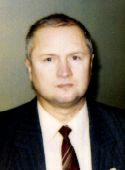 Department
DepartmentTechnical Mechanics Department
OrganizationMurmansk State Technical University
Emailalexander.papusha@mstu.edu.ru
Phone+7-8152-459188
AddressSportyvnay 13
Murmansk Russian FederationBio*I am interested in collaboration with institutions interested in implementing new computer methods for research and including such methods in training courses and research.*Alexander Papusha is Professor in the Applied Mathematics Department at Murmansk State University, where he has been since 1987. He received his Master's Degree in Mechanics from Kiev State University in 1974 and his Ph.D. in Math and Physics from the Institute of Mechanics of the Ukrainian Academy of Sciences in Kiev in 1977.
His research interests include computer simulations and processing of geophysical observations in northern Russia with novel analyses based on Mathematica 3.0 computer techniques; processing of the data field theory of non-linear dynamical systems; chaos & dynamics models in non-linear mechanical systems; investigations of the new kind of dissipative structure in geophysics with computer modeling. He is a member of the St. Petersburg Academy of Sciences and Arts.
He is interested in addressing any type of audience through the Visiting Speakers Series. He is least available to participate from September to December.
His lecture topics include:
* *Mathematica* as a tool for processing geodissipative structures data.
* Mathematical problems of geodissipative structure: obtaining, processing and interpretation .
* *Mathematica* implementation in the non-linear theory of elasticity: curve line orthonormal basis
